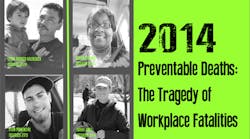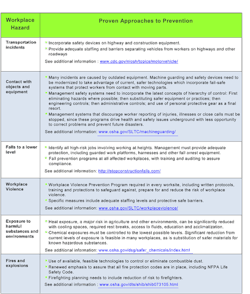More than 50,000 U.S. workers die each year due to occupational injuries and illnesses, according to Preventable Deaths 2014, a report released by the National Council on Occupational Safety and Health (National COSH).
“No one should have to risk their life simply to earn a living,” said Jessica Martinez, deputy director of National COSH. “Many of the injuries and illnesses that are killing American workers can be prevented. We know the safety systems, equipment and training that can stop people from dying on the job, and it’s absolutely urgent that we take action to protect workers and their families.”
Key findings of Preventable Deaths 2014 include:
- In 2012, at least 4,383 workers died from sudden traumatic injuries in 2012 – a preliminary figure that is likely to increase when final data are released by the U.S. Bureau of Labor Statistics at the end of April.
- Tens of thousands of workers die each year from long-term occupational illnesses. One estimate puts the toll at 53,000 deaths annually, causing untold harm and suffering – and costing the U.S. economy $45.5 billion a year.
- Nearly 700 deaths can be prevented every year by timely adoption of a standard limiting workplace exposure to silica. This silent killer can cause silicosis, lung disease, cancer and other fatal conditions.
The report highlights data showing high risks in the workplace faced by Hispanic workers. For each of the past five years, the on-the-job fatality rate for Latino workers has been significantly higher than for U.S. workers as a whole.
Preventable Deaths 2014 also identifies proven approaches to prevention for each of the six major causes of occupational fatalities identified by the Bureau of Labor Statistics: transportation incidents, contacts with objects and equipment, falls to a lower level, workplace violence, exposure to harmful substances and environments, and fires and explosions.
The report also details actions taken by local health and safety coalitions to advocate for safer workplaces and to prevent workplace fatalities. Local organizations in California, Massachusetts, New York, Tennessee, Texas and Wyoming this week are issuing reports on workplace fatalities in their individual states in conjunction with Workers’ Memorial Week activities.
Workers’ Memorial Day Honors Workers
“Today, we honor the dead and fight for the living,” said Jessica Martinez, deputy director of the National Council for Occupational Safety and Health. “We know that many of the injuries and illnesses that are killing American workers can be prevented. Employers must be held accountable when they fail to observe well-established well-established safety practices. And workers must have the education, training, resources and protection against retaliation they need to stand up for workplace safety.”
Several groups are releasing reports about workplace injuries, illnesses and fatalities. These groups include:
California: WORKSAFE, “Dying at Work in California: The Hidden Stories Behind the Numbers.” Details the stories of temporary workers, transit workers and food processing workers. Outlines the industries with highest rate of fatalities, profiles the cost of workplace injuries and illnesses, and summarizes steps health and safety agencies need to take to prevent workplace injuries and fatalities.
Massachussetts: MASSCOSH, Dying for Work in Massachusetts: Loss of Life and Limb in Massachusetts Workplaces.” Details, background and recommendations on the 48 Massachusetts workers who died on the job; the estimated 480 who died from occupational diseases; the estimated 1,800 who were newly diagnosed with cancers caused by workplace exposure and the 50,000 more who were seriously injured at work.
New York: NYCOSH, Examining New York’s Workplace Deaths and the Construction Industry. Focuses on the twenty-three workers who died in New York’s “deadliest industry” in 2013, and provides recommendations on the state and federal level to prevent such tragedies in the future.
Tennessee, Knox Area Workers’ Memorial Day Committee, Tennessee Workers: Dying for a Job – A Report on Worker Fatalities in Tennessee, 2012 & 2013. Focuses on unnecessary deaths on public works projects, the high fatality rate among immigrant and Latino workers, and lack of enforcement.
Texas, Houston Area Workers’ Memorial Day Report, Deaths at Houston Workplaces in 2013. Reports on 47 workplace deaths in the Houston area; profiles several individual cases, details local health and safety initiatives.
Wyoming: WYCOSH, Preventable Deaths: Safety & Health in Wyoming. Provides 12 steps for the state and its private employers to improve worker and safety health, including, expanding Wyoming OSHA’s capacity to enforce its rules, jailing repeat violators, protecting workers from exposure to silica, and improving legal protections for whistle-blowers.
The Wyoming report illustrates the devastating effects workplace deaths have on families with two stories of fathers who lost sons who were killed on the job.
“You know, you just want to lay down and die,” said Casper, Wyo., resident Ed Simmons said, describing how he felt after his son Anthony died in a fall while working on April 10, 2013.
Simmons was a speaker at a Wyoming commemoration of Workers’ Memorial Day that took place April 28, in the rotunda of the state Capitol in Cheyenne.
Wyoming experienced 33 workplace fatalities in 2008, 19 in 2009, 34 in 2010, 29 in 2011. This five-year high comes despite efforts by the Wyoming Legislature to entice employers with a grant program aimed at helping them build their company safety programs and an expanded courtesy inspection program.
For information about Workers’ Memorial Week events, visit the National COSH web site.


